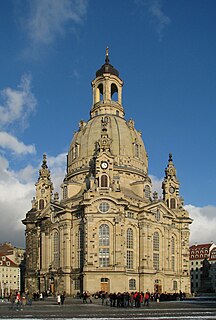
Dresden is the capital city of the German state of Saxony and its second most populous city, after Leipzig. It is the 12th most populous city of Germany, the fourth largest by area, and the third most populous city in the area of former East Germany, after Berlin and Leipzig. Dresden's urban area comprises the towns of Freital, Pirna, Radebeul, Meißen (Meissen), Coswig, Radeberg and Heidenau and has around 790,000 inhabitants. The Dresden metropolitan area has approximately 1.34 million inhabitants.

Meissen is a town of approximately 30,000 about 25 km (16 mi) northwest of Dresden on both banks of the Elbe river in the Free State of Saxony, in eastern Germany. Meissen is the home of Meissen porcelain, the Albrechtsburg castle, the Gothic Meissen Cathedral and the Meissen Frauenkirche. The Große Kreisstadt is the capital of the Meissen district.

The Dresden Frauenkirche is a Lutheran church in Dresden, the capital of the German state of Saxony. An earlier church building was Catholic until it became Protestant during the Reformation.

Günter Blobel was a Silesian German and American biologist and 1999 Nobel Prize laureate in Physiology for the discovery that proteins have intrinsic signals that govern their transport and localization in the cell.

Kurt Hans Biedenkopf was a German jurist, academic teacher, and politician of the Christian-Democratic Union (CDU). He was rector of the Ruhr University Bochum.

George Bähr was a German architect.

Siegfried Matthus was a German composer, conductor, and festival founder and manager. Some of his operas, such as Judith, were premiered at the Komische Oper Berlin in East Berlin. In 1991, he founded the chamber opera festival Kammeroper Schloss Rheinsberg and directed it until 2018. In 2005, he composed a Te Deum for the reopening of the Dresden Frauenkirche. Matthus is considered one of Germany's most often performed contemporary composers.

Gottfried August Homilius was a German composer, cantor and organist. He is considered one of the most important church composers of the generation following Bach's, and was the main representative of the empfindsamer style.

The Frauenkirche is a church in Munich, Bavaria, Germany, that serves as the cathedral of the Archdiocese of Munich and Freising and seat of its Archbishop. It is a landmark and is considered a symbol of the Bavarian capital city. Although called "Münchner Dom" on its website and URL, the church is referred to as "Frauenkirche" by locals.
Eberhard Havekost was a contemporary German painter based in Berlin and Dresden, who exhibited internationally.

The Dresden Elbe Valley is a cultural landscape and former World Heritage Site stretching along the Elbe river in Dresden, the state capital of Saxony, Germany. The valley, extending for some 20 kilometres (12 mi) and passing through the Dresden Basin, is one of two major cultural landscapes built up over the centuries along the Central European river Elbe, along with the Dessau-Wörlitz Garden Realm downstream.

The Neumarkt in Dresden is a central and culturally significant section of central Dresden, Germany. The historic area was almost completely wiped out during the Allied bomb attack during the Second World War. After the war Dresden fell under Soviet occupation and later the communist German Democratic Republic which rebuilt the Neumarkt area in socialist realist style and partially with historic buildings. However huge areas and parcels of the place remained untilled. After the fall of Communism and German reunification the decision was made to restore the Neumarkt to its pre-war look.

Ludwig Güttler is an internationally known German virtuoso on the Baroque trumpet, the piccolo trumpet and the corno da caccia. As a conductor, he founded several ensembles including the chamber orchestra Virtuosi Saxoniae. His name is sometimes written in English as Ludwig Guttler.
Christoph Ludwig Fehre was a German composer and organist. He was the brother of David Augustin Fehre.

Daniel Kern Manufacture d'Orgues were an organ builder based in Strasbourg, France. Their organs were installed in many churches in France and other countries. In addition, the firm undertook restoration work on historic organs.

Wolf Caspar Klengel, from 1664 von Klengel, was a German architect in Saxony,

Michael Kretschmer is a German politician of the Christian Democratic Union (CDU) who has been serving as Minister President of Saxony since 13 December 2017. Since 2022, he has been one of four deputy chairs of the CDU, under the leadership of chairman Friedrich Merz.

The Kulturpalast Dresden is a modernist building built by Wolfgang Hänsch during the era of the German Democratic Republic. It was the largest multi-purpose hall in Dresden when it opened in 1969, and was used for concerts, dances, conferences and other events. The building underwent several years of reconstruction beginning in 2012 and opened with a new concert hall in April 2017.
The Stiftung Frauenkirche Dresden is a legally capable foundation under civil law in Dresden established on 28 June 1994. Its purpose was initially the reconstruction of the Dresden Frauenkirche according to George Bähr's historical model. Since the completion of the work and the church consecration on the eve of Reformation Festival in 2005, the focus of the foundation's work has been on the preservation of the building and its use for church services and as a venue for holding symposia, lectures, concerts and exhibitions. The Frauenkirche is intended to serve as a landmark for tolerance and peace among peoples and religions.
Dankwart Guratzsch is a German journalist. He has made a name for himself above all as an architecture critic.















